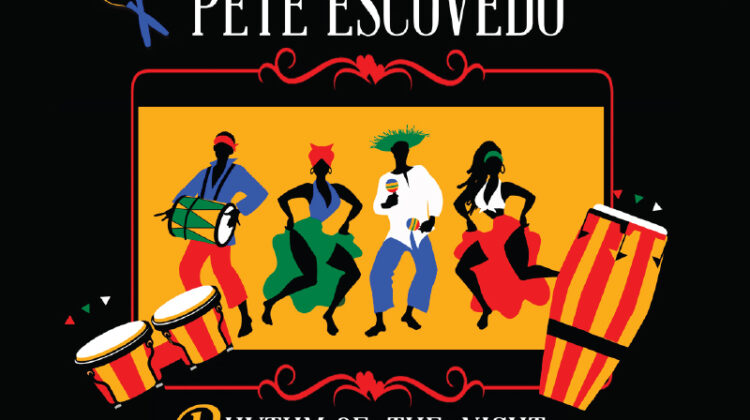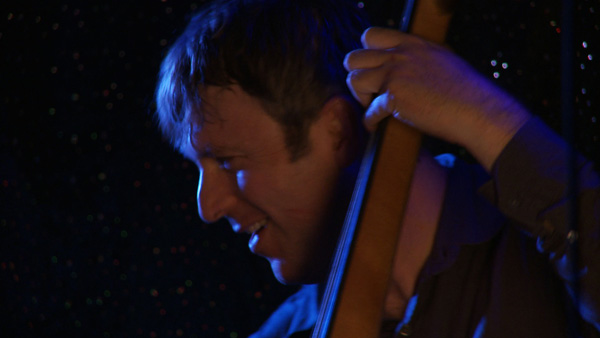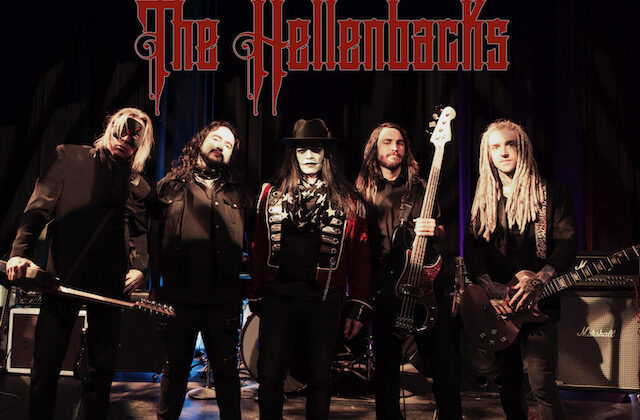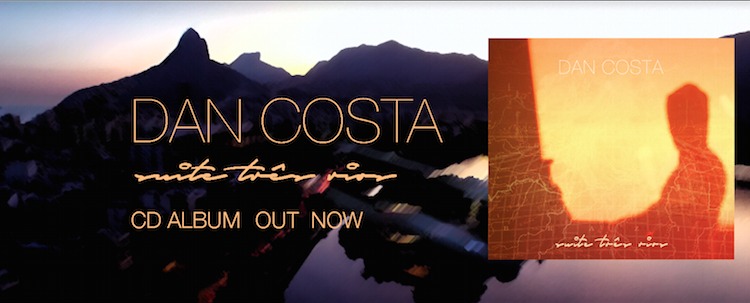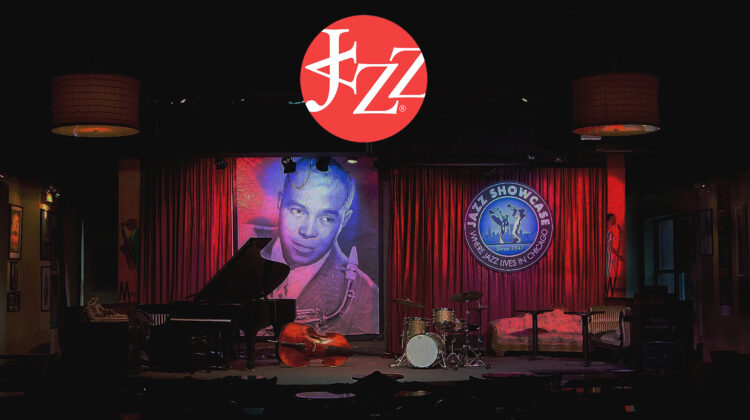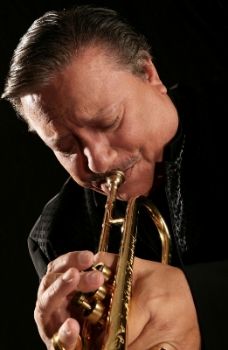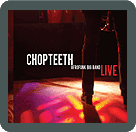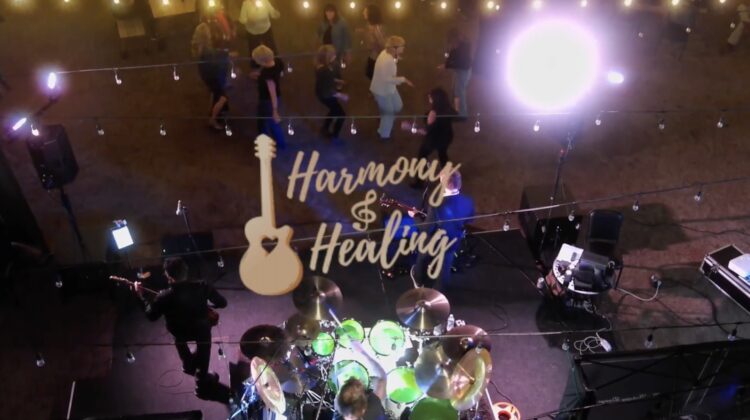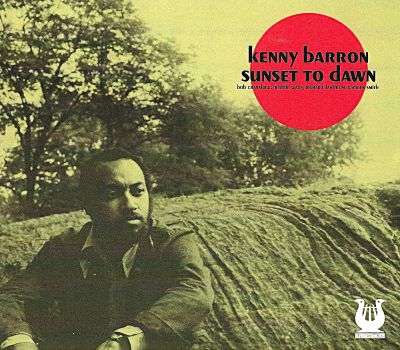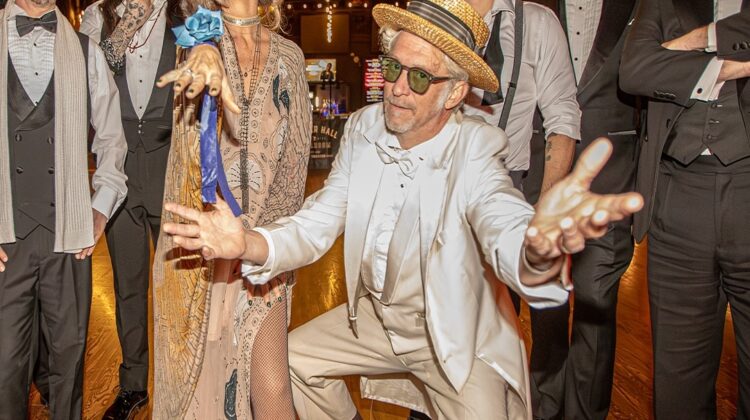African music is flourishing in the most unlikely places.
And if cutting-edge, US-based African music big-band, Chopteeth, has anything to do with it, the myriad fusions of Congolese Soukous, Ghanaian Highlife and Nigerian Afrobeat will waft even further across America.
Chopteeth (taken from the title of a Fela Kuti song) continues to hit audiences upside their heads with a throbbing horn section that is as much a cross between the Tower of Power, and one of the late Fela Kuti’s large groups of the 1980s.
Roving across huge swathes of the frontiering music scene of 1970s West and Central Africa, their latest release, Chopteeth Live, is guaranteed to fill dance floors, even if the instrumentation leans sometimes toward tricky jazz arrangements, striking an intelligent balance between the need to boogie or just nod along in quiet enjoyment.
The CD, released this year on the GriGri imprint, was recorded at the Black Cat, the Rock & Roll Hotel, and the 9:30 Club in Washington DC. It was an opportunity to unearth previously obscure gems, such as the Duke’s “Didjeridoo”, also recorded live at the Duke Ellington Jazz Festival of 2008
and “Freedom Dance”, by Nigerian jazzman, Peter King.
In the following interview, Chopteeth vocalist/guitarist Michael Shereikis and bassist Robert Fox, yield penetrating insights into the disc and African music.
John Stevenson: The rhythmic arc traced by Chopteeth’s repertoire is pretty sweeping. Is there broad agreement among the musicians about your musical directions?
Michael Shereikis: We’re pretty much a group of unabashed wanderers and myna birds, so anything’s fair game within the general concept. That said, Robert and I established an early repertoire and overall territory for the band, anchoring things in Fela’s Afrobeat, while also exploring related African dance music with similar instrumentation. From there, we’ve added songs that various band members think would fit, and that we can arrange for Chopteeth, along with some original songs. If a track feels right to everyone in rehearsal, we slip it into the next show and see what happens. Broad agreement is kind of built into that whole process.
Robert Fox: Several of the band members are dedicated music collectors, and if you total it up there is a pretty deep collective music knowledge among the group members – particularly in different West African music forms like Afrobeat, Highlife and Soukous, but also in forms that connect Africa to the Americas like Jazz, Rhumba, Funk and Soul. That’s a broad range that could take the band in a lot of different directions, but I think we’re united on the joy of playing that 1970s-era West African big band sound. It contains many other forms within it, and there is a mind-bending range of tones and grooves present. A great period of musical creativity and expression.
JS: You have come up with energetic and tastefully mannered renditions Fela Kuti’s 1977 hit ‘J.J.D’, and the buoyant ‘Question Jam Answer’. To what extent do you as a group grapple with the kind of political questions that Fela dedicated his life to posing to those in the corridors of political office?
MS: We try to closely respect the original version when we play Fela, and part of that is working in as many of the lyrics as we tastefully can. Fela’s message, after all, is what the music was crafted to support. We also try to bring a similar message forward in some of our original songs (Struggle, Weigh your Blessings, Dog Days, No Condition is Permanent). Thankfully within the band there is basic agreement on political and social questions, so our message has never been an issue. I don’t think this could work otherwise.
RF: The band has always been politically engaged, and we’ve made it a point to be a part of the social justice community. We’ve done a number of shows at protest events and fundraisers over the years. In 2004 we headlined a huge Counter-Inaugural Ball in DC on the sad night of Bush’s second inauguration, and we’ve played at union organizing rallies, immigrant rights events, Earth Day on the Mall, and many other similar events. It’s part of who we are as individuals and as a band, and some of us in the band have been life-long political activists outside of music. And of course Fela’s courage over many years in resisting the Nigerian military dictatorship was one of the inspirations for starting the group in 2004, at a time when to many of us, it seemed our own country was seriously on the wrong track. Secret prisons, unlimited detentions without charges, torture – unfortunately it all would have been very familiar to Fela. His intense dedication to human rights and justice is present in many of his song lyrics, and I always figured that if you don’t feel that yourself, then maybe you should be playing some other music.
JS: You’ve also managed to conjure up the febrile energy of the Fela-era Shrine in the heart of the American seat of political power. What kind of audiences attended the live sessions at the Black Cat, The Rock & Roll Hotel and the 9:30 Club?
MS: If we can muster even a thousandth of the Shrine’s energy and ethos in DC, we must be doing something right! Club gigs like the ones captured on the CD are usually a lovely mix of humanity, most of who come to the show to dance. Many in the crowd already love African music and are happy to have it performed live by a big band, while others are just grooving and may not have any experience with African music. Ethnicity and age don’t seem to be barriers to enjoying a Chopteeth show either, so we get a nice range there as well.
RF: Chotpeeth gets a pretty broad audience at our shows, from young hipsters to serious dancers to jazz freaks and everything in between. I love that we often have a contingent of older African immigrants at our shows that knew the original music, and the sounds we’re trying to resurrect on the Chopteeth Live CD. But no, I don’t think you can compare it to Fela’s Shrine, really – that’s blasphemy! I think that was a unique musical and cultural situation, although we of course do appreciate the irony of our denouncing injustice from within the beating heart of Babylon, Washington, DC.
JS: African music of the 1970s was characterized by political ferment and a lot of experimentation drawing on jazz, Afro-Latin meters, James Brown’s funk and hard-rock strains. Why were you drawn to this specific era?
MS: For the characterizations you mention, certainly. Africa in the 70s was truly a crucible of musical styles and political engagement, and I can think of no better time or region to inhabit musically. Personally, I’d been listening to and playing African guitar for years, so when Robert suggested we start an Afrofunk project, I was sceptical, but definitely in. That was my path to this band anyway. We all came in on different roads. As for the politics in our music, that’s just part of the package when you’re anchored in Fela I think. It helps that we’re all on basically the same page politically within the band, and it just seems appropriate here inside the Beltway.
RF: West Africa in the early 1970s experienced a musical flowering that was the culmination of decades of ever-intensifying interchange with music from other parts of the world, especially with Cuba and the US. LPs became more widely available, radio expanded its reach, independence opened up new cultural spaces that had previously been choked off during colonialisation. Obviously that was a process that had started hundreds of years earlier, but there really was a golden moment of musical development in the early 1970s that reached across many different countries. Thankfully, more and more of that era’s music is being reissued, and it’s now more widely available than ever before. Soundway Records in London, Strut Records, Sterns Music and a number of others are doing a great job drawing attention to some of the amazing recordings of the time. But the liberating mix of jazz, funk and traditional African sounds was a radical step forward, and to me, it sounds just as thrilling and exciting as it must have at the time. But we’re not preservationists or re-creators, and the West African big band sounds of the early 1970s provide such a broad platform to work from that we’ve found many new directions to take the music in, both in our original material and our covers. Plus they had incredible fashion sense back then. I’m still trying to get Chopteeth to wear matching orange suits with bell-bottom pants. No luck so far, but I’m trying.
JS: Beyond a few college campuses, and die-hard Afrobeat and highlife cognoscenti, is there an appreciation for your music in the US?
MS: I think there is. But those are two solid communities for starters! Our first CD received excellent reviews, and our new live album is getting a similar reception. So there is tangible appreciation out there, and hopefully as we continue to evolve and make more and more music, more and more people will find it and dig it, etc. We stay focused on the crowd in front of us in the meantime.
RF: There does seem to be a somewhat heightened awareness of at least Fela, if not Afrobeat in general, in the wake of the ‘Fela’ Broadway show’s success. And that may have some spillover effect that is beneficial in encouraging more people in the US to explore the rich musical output of West Africa. Certainly most people who come to our shows in the US are familiar with funk, with jazz and with soul, so even if they’ve never heard music from Ghana or Congo or Ivory Coast, they know the feel, and they like it.
JS: What distinguishes Chopteeth from Afrobeat groups like Antibalas?
MS: Firstly, props: Antibalas is a huge part of the reason why Chopteeth exists. Robert would go to their shows while living in Brooklyn, and had a similar thing in mind once he settled in the DC area. My first love has always been Central African music, so in addition to Afrobeat we agreed on some Highlife and Senegalese Rhumba, then ventured East and Central, etc. That wanderlust is probably what most distinguishes us from Antibalas and the slew of very excellent Afrobeat projects scattered across the US.
RF: I lived in Brooklyn for 12 years before moving to DC, and Antibalas made a big impression on me when they started. I had previously done work as a DJ and sometimes spun on a radio show in Boston, and I had been listening to Fela since the early 1980s. But until Antibalas came together, it had never occurred to me that one could actually play Afrobeat in real life. It seemed like a crazy fantasy come true, and seeing them early in their development in small clubs in Brooklyn was a real inspiration. I’ve seen them many times since then, and they always keep the music fresh and interesting.
We’ve tried to do the same by playing a range of styles beyond Afrobeat that reflect the varied interests of our band members. It can make for a challenging set list for us at times, but we’ve found that it keeps everyone engaged and involved – the musicians as well as the audience. Our original music also branches out quite a bit. Some of my favorite Chopteeth tunes include original songs like “Snake Eyes” and “Herky Jerk” from our first CD, or our cover of Marc Ribot’s arrangement of “Choferito Plena” from the new CD. To my ears, none of these songs really fit neatly into any musical category, Afrobeat or otherwise.
JS: Have you toured outside of the US? Do you plan to carry the Chopteeth message to Africa?
MS: We haven’t toured outside of the US, but are exploring options on the heels of our live CD release. Getting the band to Africa would be fantastic!
RF: We’d love to do more touring with the band. As with many large bands, it’s a real challenge for us, given the economics of getting more than a dozen band members and their equipment to the next town. We’re still saving up for the Chopteeth tour jet.
JS: In your publicity materials you spoke of the travails involved in tracking down Peter King, who wrote the charged and rousing number, ‘Freedom Dance’. Tell our readers the story of how and why you came to include his composition on the new CD.
RF: Some of us really loved the Peter King CD “Shango” that Strut Records released in 2002. Prior to that release, very little of Peter King’s work was available in the US. Although he was a key figure in bridging the transition from bop to Afrobeat in Nigeria back in the 60s and 70s, a lot of people in the US were unfamiliar with his work. We really wanted to include “Freedom Dance” on the Chopteeth Live CD, but we had to locate him to work out the mechanical copyright issues, and it ended up taking quite a while. I knew he had set up a music school outside of Lagos, and after unsuccessfully trying to reach him through the record company, I began searching online for his contact information.
I learned that the Cultural Affairs department of the French Embassy in Lagos had done a couple of events with Peter, and I emailed and called their staff person in Nigeria, and she said she would try and locate a cell phone number. I also found one of the teachers from the school through Facebook, and he helped me as well. Through the two of them, I was able to get Peter’s cell phone number and call him in Lagos. It was a really great to be able to speak with him directly, express our admiration for his work, and work out the copyright issues properly for the release. I hope that we can help draw more attention to Peter King’s fabulous music. It’s got an incredibly funky and exciting groove, and often includes some really radical-sounding chord progressions that come from his background as a jazz musician. It’s a clever and intoxicating mix.
JS: Duke Ellington’s ‘Didjeridoo’ is brought to life in more ways than one having hardly been performed for many years till now and featuring Craig Considine’s masterly trombone. It’s an inspired choice. I guess you all share Ellington’s orchestral affinities as a big band.
MS: It was an honor to play that song for that occasion, and we haven’t played it since. Full credit to Charlie Fishman, Duke Fest organizer, who noted that same big band affinity with Ellington and booked us. We dusted off ‘Didjeridoo’ for the occasion, hoping to make manifest the connection Fishman envisioned. Turns out he might have been on to something… Interestingly, we had Tosin Aribisala sitting in on drums that evening (Dave was injured). Tosin had been Femi Kuti’s drummer for years, and now lives and makes his music in the DC area. Always a pleasure to play with guys like that.
RF: For me personally, Duke Ellington is a primary source of musical ideas and guidance. Virtually everything about Duke Ellington’s bands are heroic to me: the scale of his musical aspirations; the brilliance of his arrangements and his musicians; the ability to execute such a complex and revolutionary vision so flawlessly; his sheer persistence and presence as a band leader; and of course his incredible productivity and genius as a songwriter. We were thrilled to be included in the 2008 Duke Ellington Jazz Festival, and it seemed like a real opportunity for us to bring one of Duke’s tunes into our repertoire, in a situation where it would be appreciated. As you know, Duke wrote “Didjeridoo” as part of his Afro-Eurasian Eclipse suite, which came out of his tour of Africa in the 1960s. It’s a wonderful song, and we had a blast learning it and playing it. I’m hoping we add more Duke songs in the future, but thankfully we caught “Didjeridoo” for the new Live CD. Recently video producer Jay Danner-McDonald, has completed a lovely video of our preparing and performing the tune at the festival. It was a special moment for us – even more so because Duke was from DC, and the 9:30 Club where we recorded the song is only a few blocks from where Duke grew up.
JS: Talking of mining artistic seams, the pairing of Mbilia Bel and Tabu Ley Rochereau has been described as near-perfect. Among the many tunes that TLR produced over the years, what made ‘Gagne Perdu’ stand out for you to include it on the new platter?
MS: My first love has always been Central African music, and I’ve been listening to a CD with that song for decades. Plus it’s in French! Francophiles will note the second verse is altered with a nod to President Barack Obama. I grew up in Springfield, IL, where Obama announced his candidacy, so that’s a hometown thing for me.
JS: The recent Orchestra Baobab classic, ‘Jiin Ma Jiin Ma’ also gets an enlivened reading. What is your comment on a piece like this making it in to your repertoire?
MS: In addition to just really admiring Orchestra Baobab, their sensibility and instrumentation fall into that same basic realm as 70s Afrobeat, Highlife and Soukous bands, on eastward and south down the continent. We’re interested in all that. For this tune, Trevor puts down his saxophones and takes the lead on vocals and flute, which makes a nice contrast with the more hard hitting stuff in our sets.
RF: Orchestra Baobab has always been one of my favourite bands anywhere in the world. They play with such an incredible confidence, style and cohesiveness. I especially like how their rhythm section fully invests in their compositions, and each musician deeply commits to their own individual part, even if it’s very simple. People – baroque is not always better! They have faith that the sum is greater than their individual line, and it’s a beautiful thing to see. That opens up so much space for the imagination of the listener, and allows the band to establish very authoritative rhythms even on their quieter tunes. Their rhythm section puts up an incredible canvas for the brilliance of soloists like OB’s guitar genius Barthelemy Atisso, who has got to be the most under-appreciated soloist on the planet. Can I get a witness? He’s truly fantastic.
JS: With the ongoing challenges in the recording and performing industry (posed by the internet) and its effect on revenues and livelihoods of musicians, how does a group like Chopteeth navigate its way into the hearts of more audiences?
MS: It’s certainly a challenging time for artists of all sorts. Every member of Chopteeth is in a different situation vis-à-vis livelihood, some with jobs, most in other bands, etc., and none of us getting rich off music. We’ve received some much-appreciated recording help through grants, but are otherwise a 100% independent production. I’m not sure that would be as doable without websites, file streaming, downloads, social networking, etc. So while the internet has altered the terrain for sure, it also offers opportunity for promotion and distribution that weren’t available to independent artists before. It’s an exciting time, with everyone making it up as they go, growing and learning all the while.
RF: Obviously you don’t start an old-school West African big band with 13 musicians if you’re in it for the money or the fame. We initiated the group with a “build it and they will come” attitude. We decided to play the music we loved the most, in the way that appealed to us as musicians and as music fans. We started playing together for the sheer joy of the music, nothing else. I know that sounds corny, but it’s true. Many of the band members have had very successful and wide-ranging music careers, and we were able to bring together some real musical heavy hitters because the songs and the rhythms are so wonderful, and so satisfying to learn and to perform together. I think that whatever success we’ve had comes from that fact alone: the music itself is fabulous, and we love creating it and playing it. For a long time my favourite moments in the band were our private rehearsals: just plug in and play, for ourselves only, without any audience or outside expectations. I think when you feel that way about your music, it comes through when you’re on stage and performing, and people connect with it. We’ve been able to raise our profile through new technologies such as low cost digital recording and editing, as well as the many forms of online promotion. That definitely helps an independent band like ours that in the past might never have been able to spread the news outside of their own neighborhood or city. And we work very hard on promotion, and we hustle every day to get the word out, like everyone else. But in the end, most of us will do just about anything to keep playing this music, regardless of whether anyone is listening. It’s just feels great. If other people enjoy it, so much the better. That approach has kept our audience growing year by year, and we’ve been happy with the success we’ve had, on our own terms.

